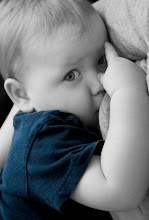
This month, 200 hospitals across the country are replacing their formula discharge bags and samples with the country’s first breastfeeding support promotional discharge bag.
The “Healthy Baby Bounty Bag” contains product samples, coupons, and information that support and encourage breastfeeding without a packet of formula and without conflicting and contradictory messages about breastfeeding. Hospitals including UCLA Medical Center, Children’s Hospital in Boston, Mount Sinai Medical Center in New York City, and Exeter Hospital are among the first to distribute Healthy Baby Bounty Bags to new moms.
The bags are created by Cottonwood Kids, a promotional products company that produces custom gifts for hospitals. The bags are green, made from recycled materials, and are 100 percent lead free. They are designed to serve as a cooler and storage carrier for breastmilk. All items inside are compliant with the International Code of Marketing of Breastmilk Substitutes (also known as the WHO Code), and are therefore completely focused on the importance of breastfeeding with no nipples or bottles included.
The samples are as follows:
Disposable Nursing Pads
Milk Storage Bags
Latch on Tips card
Mothers Milk Tea
Diaper Wipes
Aquaphor Baby Healing Ointment
Boogie Wipes Anti Viral Tissues
Sani Hands- Hand Sanitzer
Sear Portrait Studio Coupon
Free Gift Card for the mother that gifts can be redeemed on-line. Everyone gets a gift. Prizes include a $5,000 savings bond, free breast pumps nursing pillows and more.
Coupon Book that includes coupons from the following companies
Lansinoh – Gel Pads
Lansinoh- Breast Pads
Lansinoh- Pumps
Lansinoh- HPA Lanolin Breast Cream
Lansinoh – Breastmilk Storage Bags
Bravado Designs Breastfeeding Bras
Mother’s Milk Organic Tea to promote lacation
My Brest Friend Nursing Pillows
Bebe Au Lait Nursing Covers
Aquaphor Diaper Cream, Shampoo and Healing Ointment
Sear Portrait Studios Portraits
Seventh Generation Diapers
Seventh Generation Wipes
Seventh Generation Natural Cleaning Products
Seventh Generation Feminine Care Products
Boogie Wipes Anti Viral Tissues
Sani Hands Hand Sanitizer
Ergo Baby: Ergonomically correct baby carriers
Baby Stay Asleep: Infant positioning System to help with reflux
Belly Bar Nutrition Products for Mothers
Milkscreen Human Milk Banking Association of North America
The coupons themselves add up to over $100.00 in savings.
Visit www.cottonwood-kids.com/gift for all the details.


